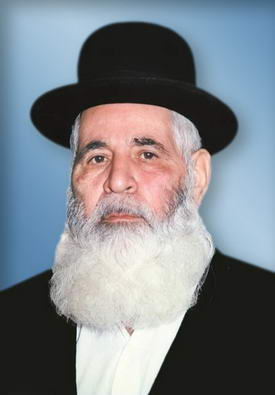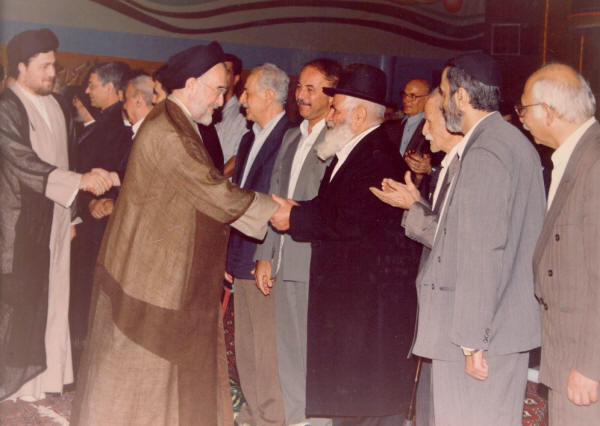
Rabbi Yosef Haim Hamadani Cohen, also known as Yosef Hamadani Cohen, was born in February 1922 in a religious and traditional family in Yazd, Iran.
His father, “Orhaim Hamadani Cohen”, was a clergy member in the Iranian Jewish community in Yazd. He was a Torah teacher and advocated halakhic matters (i.e., Jewish religious law). His grandfather, “Haji Hilel”, was also among the prominent clergy and religious authorities in Yazd.
Yosef Hamadani Cohen’s primary education coincided with the establishment of the Alliance school in Yazd. According to the prevailing tradition of the time, he began his religious studies under the guidance of his father and grandfather. He furthered his religious education in Yazd’s yeshiva (religious school) at Mekatb-e Molla Davood (i.e., Molla Davood’s Education Place), where he excelled in studying the Jewish Shari’a, which included the interpretation of the Torah, Mishnah, and Gemara.
At the age of eighteen, Mr. Hamadani moved to Shiraz, where he pursued advanced religious studies and achieved mastery in Jewish religious sciences, as well as becoming a proficient shochet (license to kill cattle and poultry as instructed by Jewish law). After receiving semikhah (i.e., rabbinic ordination), he returned to Yazd.
Back in Yazd, he initially embarked on a teaching career, simultaneously guiding and tending to religious duties, including instructing the youth in Torah and matters of culture. From a young age, he established strong bonds with Jewish values and, thanks to his inherent talent and wisdom, quickly took a teaching role at the yeshiva in Yazd.
Rabbi Yosef Hamadani Cohen married Nargis, a member of the Reihanian family, in 1946. Their marriage was blessed with the birth of three sons and three daughters.
From the mid-1960s, the Iranian Jews Jewish community in Yazd began to dwindle as members migrated to the capital and other areas. Consequently, in 1977, Rabbi Yosef, together with his family, decided to migrate to Tehran to expand his activities further. They settled in a house in the Pole Choobi neighborhood.
After obtaining the necessary permits to establish an office for marriage and divorce services, He used one room of his house as the notary office. Simultaneously, he served the Jewish community along with other scholars, opening a new chapter in his life of community service.
In 1993, following the emigration of the religious leader of the Iranian Jewish community, the late Rabbi Uriel Davidi, Rabbi Yosef Hamadani Cohen was accepted as the religious leader of the Iranian Jewish community. This recognition was made official by the Iranian Jewish Committee’s board of directors. Additionally, he assumed responsibility for leading the Beth Din (Jewish religious court) and the Rabbinical Assembly, and presiding over the Conflict Resolution Council. He was also the Rabbi of the Bagh Saba Synagogue for years.

Among the ethical qualities attributed to Rabbi Yosef Hamadani Cohen were his humility and modesty. His detachment from worldly interests was an exemplary illustration of his humble and peace-seeking nature. He consistently strived to foster positive relations with adherents of monotheistic faiths. Notably, he maintained friendly ties with the leaders of the Islamic Republic. In February 2003, a positive meeting occurred between Rabbi Yosef Hamadani Cohen and the then-President of Iran, Seyyed Mohammad Khatami, during a ceremony at the Yosef Abad Synagogue in Tehran.
Rabbi Yosef Hamadani Cohen is recognized as one of the most prominent religious authorities of Iranian Jews. His impact became especially prominent following the Iranian Revolution.
Over the course of more than seventy years, he not only performed religious rituals, Shechita (ritual slaughter), Ketubah (marriage contract), Milah (circumcision), marriages, divorces, and Bar Mitzvah (coming of age ceremony) accurately, but was also actively involved in charitable work, resolving marital and family disputes, and more.
A matter of significant importance to Rabbi Yosef was the observance of kashrut within the Iranian Jewish community, which he personally supervised diligently. He also demonstrated a keen sensitivity in addressing disputes and divorce matters, making consistent efforts to mediate and encourage couples to maintain their marital bonds, effectively preventing numerous divorces. Furthermore, in most of his public service initiatives, he selflessly dedicated his time without seeking any compensation.
Rabbi Yosef represented the Iranian Jewish minority in Iran in a ceremony held by the municipality for religious minorities and received a commendation from the then-President, Mahmoud Ahmadinejad.
Towards the end of the 2000s, Rabbi Yosef started to reduce his social commitments as he grew older and retired. He often delegated different tasks to his students, who had received their education at his school, and closely supervised their work.
On 17th March 2015, after completing the evening prayer, Rabbi Yosef Hamadani Cohen passed away peacefully at the age of 92, surrendering his soul to the eternal realm.


 فارسی
فارسی